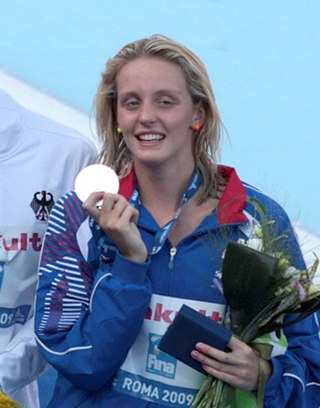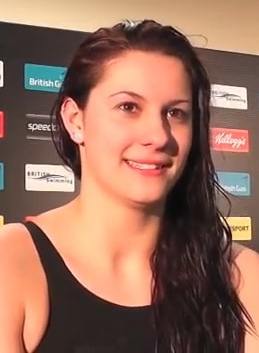
Brunel University London is a public research university located in the Uxbridge area of London, England. It was founded in 1966 and named after Isambard Kingdom Brunel, the Victorian engineer and pioneer of the Industrial Revolution. In June 1966, Brunel College of Advanced Technology was awarded a royal charter and became Brunel University; in 2014 the university formally adopted the name Brunel University London (BUL). The university is considered a British plate glass university.
Jason Carl Gardener, is a retired British sprint athlete. A fast starter from the blocks, he won an Olympic gold medal leading off Great Britain in the 4 x 100 metres relay at the 2004 Olympic Games, and is also the 2004 World Indoor Champion, and a four-time European Indoor champion, at 60 metres.
Kate Louise Howey is a former elite British judoka. She remains the only British woman to have won two Olympic judo medals and shares with fellow Olympic medalist Karina Bryant the record of being the only British judoka to have competed at four Olympic Games.
Allyn Condon is an English former sprinter and bobsleigher. At the Vancouver Olympic Games in 2010 he became the seventh person to have competed for Great Britain in both the Summer and Winter Olympic Games having already competed in the Sydney Olympics in 2000.

Christine Ijeoma Ohuruogu, MBE is a British former track and field athlete who specialised in the 400 metres, the event for which she is an Olympic, World and Commonwealth champion. The Olympic champion in 2008, and silver medalist in 2012, she is a double World Champion, having won the 400 m at the 2007 and 2013 World Championships. She has also won six World championship medals in the women's 4 × 400 m relay as part of the Great Britain and Northern Ireland team and bronze Olympic medals with the women's 4 × 400 m relay at the 2008 Beijing Games and the 2016 Rio Games, her final Olympics. Ohuruogu shares with Merlene Ottey and Usain Bolt the record for medalling in most successive global championships – 9 – between the 2005 World Championships in Athletics and the 2016 Summer Olympics.
Alan Peter Pascoe is a British former athlete who gained success in hurdles. After his athletics career, he has been successful in events marketing and consulting.

Gregory James Rutherford MBE is a retired British track and field athlete who specialised in the long jump. He represented Great Britain at the Olympics, World and European Championships, and England at the Commonwealth Games. In September 2021 Rutherford was selected as part of the British bobsleigh team but was injured during preparations to qualify for the 2022 Winter Olympics.
Andrew David Jameson is an English sports commentator and former competitive swimmer. Active as an elite swimmer in the mid-to-late 1980s he represented Great Britain in two consecutive Summer Olympics, the FINA World Championships, LEN European Championships, as well as England in the Commonwealth Games. At his peak between 1986 and 1988 he won the gold medal in 100 metre butterfly at the 1986 Commonwealth Games, the 1987 European Aquatics Championships and the 1987 Summer Universiade, as well as the 100 metre freestyle gold at the same Universiade. Winning the bronze medal at the 1986 World Aquatics Championships, Jameson's career in the pool culminated in winning the bronze medal in the 1988 Summer Olympics, his second and final Olympic Games.
Joslyn Yvonne Hoyte-Smith is a British former 400 metres athlete. Joslyn grew up in Leeds and attended Matthew Murray High School between 1966 and 1973.

Louis Antoine Smith MBE is a retired British artistic gymnast.
John Alun Adolphus Herbert is an English former sportsperson, who represented Great Britain as both a triple jumper and a bobsledder. Competing in athletics, he won the gold medal for England in the triple jump at the 1986 Commonwealth Games in Edinburgh. He represented Great Britain at the 1984 Summer Olympics and 1988 Summer Olympics. He competed in the four-man bobsleigh event at the 1994 Winter Olympics.

Francesca Jean Halsall is a retired English competitive swimmer who has represented Great Britain at the Olympics, FINA world championships, and European championships, and England at the Commonwealth Games. She competed primarily in freestyle and butterfly events.
Gillian Mary Donaldson was a British fencer and Olympic champion in foil competition. She won a gold medal in the women's individual foil event at the 1956 Summer Olympics in Melbourne. She also competed at the 1952 and 1960 Summer Olympics.

Kate Louise Richardson-Walsh, is an Olympic Gold and Bronze Medal winning English field hockey player. She was capped a record 375 times for her country and was the England and Great Britain Captain for 13 years.
Peter Jacobs is a British épée fencer who competed at the Olympics.

Aimee Willmott is an English competitive swimmer who has represented Great Britain at the Olympic Games, FINA world championships and European championships, and England in the Commonwealth Games. She was the 2018 Commonwealth Games champion in the 400 metres individual medley.
Verona Marolin Elder MBE is a female British, Commonwealth and European medal winning English 400 metres runner and is now the manager of the British athletics team for people with learning disability.

James George Guy is an English competitive swimmer who specialises in freestyle and butterfly. Guy has won multiple gold medals at each of the major international meets available to him, including for Great Britain at the Olympic Games (2), the World (5) and European Championships (7), and England in the Commonwealth Games (2). In addition to further medals in those events, he has also reached the podium at both the World and European short-course championships. With 45 major medals at international championship meets, 19 at global level, he is one of the most decorated swimmers in British history.

Thomas William Darnton Dean is a British competitive freestyle swimmer. He is a double Olympic gold medalist, winning gold individually in 200 metre freestyle and as part of a team in 4 × 200 m freestyle relay at the 2020 Summer Olympics.

Matthew Richards is a British swimmer specialising in 100 and 200 metre freestyle, active internationally from 2020. He won the gold medal in the 200 metre freestyle at 2023 World Aquatics Championships, Olympic gold in the 4 x 200 metre freestyle relay at the 2020 Summer Olympics and World gold in the same event at the 2023 World Championships.









